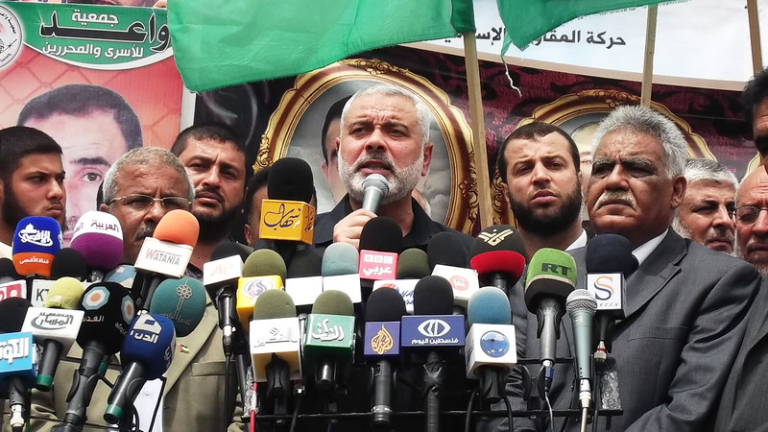
Four months of warfare between Israel and Hamas have generated regional and global dynamics that will shape the Middle East for decades. But the war in Gaza has already clarified two deeply linked central dimensions of the Middle East: Arab states’ low-key, rhetoric-heavy response to the Gaza war and Hamas, and the new reality that those who actually fight and resist Israel and the United States across the region are Arab non-state armed actors (NSAAs) with close ties to Iran. These two symbiotic phenomena indicate how Arab states have become politically and militarily passive in the face of stronger adversaries—and hint at the future Middle East order if prevailing conditions persist.
At the outbreak of the war, Arab governments struggled to respond to the political, human, and geo-strategic dimensions of the Gaza crisis, which often contradicted one another. Governments had to walk a delicate line among at least four important considerations: How to support the Palestinian cause, which resonates deeply across the region (and the world, it turns out); how to do this without strengthening Hamas and other Islamist militant allies that most Arab governments see as radicalizing threats; how to criticize the United States and other western powers for enabling Israel’s destruction of Gaza without leading them to curtail their existential financial and security support to many Arab states; and how to provide humanitarian aid for the 2.3 million defenseless civilians in Gaza whom Israel has killed, wounded, and brutalized in genocidal fashion.
The Arab States’ Response
The Arab states offered Gazans, Hamas, and the larger Palestinian cause a combination of low-key rhetorical, material, and diplomatic support that seemed almost imperceptible and that ultimately was powerless on the global political stage. The support achieved none of the desired goals of reducing or stopping Israel’s attacks, providing Gazans with sufficient aid, or guaranteeing a full Israeli withdrawal from the Strip.
Arab regimes risk being badly beaten if they decide to fight Israeli aggression and they risk domestic turbulence if they remain silent.
There have been a few substantive responses from Arab governments. Egypt and Jordan insisted that they would not accept any Gazans expelled by Israel. Jordan and the United Arab Emirates (UAE) set up field hospitals to treat the wounded, delivered medical supplies through air drops, and established satellite internet links to allow doctors to treat patients in Gaza remotely. Egypt and Qatar continue to mediate among Hamas, Israel, and the United States for brief ceasefires, greater humanitarian aid flows, and exchanges of detainees and hostages.
Saudi Arabia has hosted meetings of key Arab states and the Palestinian Authority to explore options for Palestinian governance and reconstruction in Gaza after the fighting stops. In mid-October, a delegation from the Arab League-Organization of Islamic Cooperation summit in Saudi Arabia visited leading capitals to push for the summit’s goals of achieving a ceasefire, increasing humanitarian aid to Gaza, and building support for an independent Palestinian state.
As Arab governments could neither fight Israel nor remain neutral, they made familiar but mostly symbolic steps—issuing statements, holding summits, lobbying and voting for United Nations resolutions, calling for a ceasefire, withdrawing their ambassadors from Israel (Jordan), demanding humanitarian assistance to Gaza, publicly criticizing Israeli aggression, and supporting Palestinian rights. Some offered material succor when Israel allowed that, while Jordan, Qatar, the UAE, Lebanon, and others hosted children in their hospitals for emergency surgery. Some pleaded in vain with the United States and other powers to make Israel respect international law and avoid attacking civilians.
The Axis of Resistance Does the Fighting
When the Arab states could not confront familiar imperial tormentors in Tel Aviv, London, and Washington, they by default left the heavy lifting to the regional network of NSAAs. Hamas in Palestine, Hezbollah in Lebanon, Ansar Allah in Yemen, the Popular Mobilization Forces (PMF) and half a dozen smaller militant groups in Syria and Iraq are supported by Iran, with whom they form the “Axis of Resistance.”
These NSAAs, which have all emerged since the 1980s, are anchored in the nationalist identities and interests of their own states and espouse Islamist ideologies. They enjoy sophisticated military capabilities along with the will to use them as they pursue common interests in resisting Israeli and Western imperial threats. And they all have close relations with, and support from, non-Arab Iran. The current Gaza war saw their network activated for the first time at a coordinated regional level, as their member groups fought against Israel or the United States and United Kingdom on the Israel-Lebanon border and in Gaza, Yemen, Iraq, and Syria.
The passive Arab governments and the NSAAs are both products of the Middle East’s twin calamities over the last century. The first is the modern Arab state system’s legacy of erratic, often corrupt and incompetent, non-democratic governance, which has led to low-quality statecraft and chronic national vulnerability and dependence. The second calamity is Zionism’s non-stop geographical and political expansion since the 1930s, despite repeated costly but unsuccessful pan-Arab attempts to check it.
Why Do Arab States Hesitate to Support Hamas?
Arab governments could not decisively support Gaza because they remain constrained by the consequences of decades of poor policy decisions and inefficient governance. These resulted in the twin forces that constrain them today at home and abroad: domestic populist anger and desperation and dependence on external sources of aid, arms, and protection.
Ironically, a core reason for this is the Palestinian issue (especially Jerusalem and Al-Aqsa Mosque), which has long resonated widely across all Arab societies and has now risen to the top of the Middle East’s agenda—if not the agenda of the international community.
When the Arab states could not confront familiar imperial tormentors, they by default left the heavy lifting to the regional network of NSAAs.
Palestine can be a radicalizing force that threatens the stability of Arab governments, and in situations like Gaza it immobilizes them. These regimes risk being badly beaten if they decide to fight Israeli aggression and they risk domestic turbulence if they remain silent in the face of their citizens’ vehement opposition to Israel. The 2010-2011 uprisings in numerous Arab countries reminded leaderships that their citizenries are not as complacent as they may appear. Governments mainly support Palestinians with words and symbolic actions, while allowing their citizens to let off steam by joining controlled demonstrations in support of Palestine.
Immobilized Arab governments find it impossible to join the fight in Gaza or to pursue more powerful solidarity measures such as boycotts or breaking the Israeli and Egyptian siege for several reasons.
- Those who resist and fight Israel are NSAAs that Arab governments want to prevent at all costs from spreading throughout the region. Militant resistance movements that respond to citizens’ material and emotional grievances can threaten and even replace existing ruling elites (as has happened in varying degrees in Lebanon, Palestine, and Yemen).
- These groups, especially Hezbollah, Hamas, and Ansar Allah, are Arab actors that in the past quarter-century have dared to militarily defy Israel and its western backers. In Lebanon, Gaza, and Yemen, they have fought to a draw against Israel, the United States, and US-backed allies like Saudi Arabia and the UAE, forcing ceasefires, prisoner exchanges, and mutual deterrence with new rules of engagement. These NSAAs consequently earn respect and support among at least a sizable portion of Arab publics.
- The NSAAs and Iran collectively resist Israel and the United States—when most Arab governments rely on the United States and Western countries for their security, fiscal solvency, and socio-economic support. Most are too weak to confront Israel, and too dependent on such Western support to challenge the United States and Europe militarily.
- Many Arab states do not want to support Hamas openly and strengthen Iran’s links in the region. The United States has tried for decades to forge a regional alliance of Arabs, Israel, and Western governments to confront and contain Iran. But Arab leaders who fear Iran’s influence find some of their citizens cheering on Iran-linked Hamas, Hezbollah, and Ansar Allah as they defy Israel and its US enabler. In fact, the Axis of Resistance aims to drive the United States out of the Middle East, to weaken the post-World War II American Israeli-dominated Middle East regional order, and to replace it with one that better responds to what they see as the rights and aspirations of Arabs.
Most Arab governments fear this prospect, but they know that it is stoked by the pressures from their discontented citizens. Except in wealthy energy-exporting Arab states, most citizens have signaled their discontent since the 1990s but have been ignored. Signs of this widespread discontent include: large-scale youth emigration; the emergence of the NSAAs; high rates of poverty, marginalization, and inequality; citizen alienation evident in very low participation in formal politics; the emergence of militant opposition movements; protests against declining social services; and feelings of humiliation and anger due to Arab state weaknesses and subjugation by foreign powers.
These stresses have accumulated over decades and even generations, but ruling elites still respond primarily with heightened repression. In some cases, Arab governments even have turned to Israel to buy surveillance and security systems to better subdue their own citizens, which only aggravates the anger and humiliation palpable among their publics.
The combination of Arab governments’ docile behavior and the dynamic defiance of the NSAAs suggests that most Arab states are undergoing a process of “de-sovereignization.” That is, most Arab states can only make big sovereign decisions in arenas like defense, national security, trade, or Israeli or Iranian relations with the approval of a foreign power.
Perhaps Arab docility since October 7 is not a choice, but rather the inevitable consequence of the many poor decisions that leaders and their foreign backers have made since World War One. Only better choices in the future can reverse this docility and achieve the necessary change Arab societies deserve.
The views expressed in this publication are the author’s own and do not necessarily reflect the position of Arab Center Washington DC, its staff, or its Board of Directors.
Featured image credit: flickr/Joe Catron

